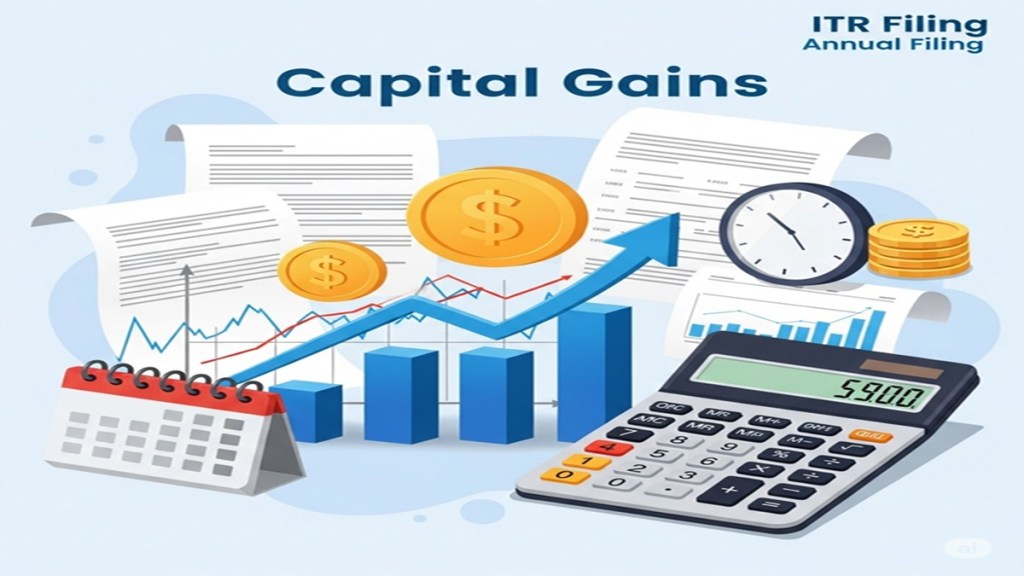On July 23, 2024, Finance Minister Nirmala Sitharaman presented the first budget of the Modi 3.0 government. While it may have seemed like just another budget to many – especially since it was her 7th consecutive presentation, for taxpayers, it was significant in many ways. The July 23 budget last year fundamentally changed how the entire taxation system will function going forward. Among the various proposals, one of the most notable announcements was related to capital gains tax.
So July 23, 2024, not only changed the direction of the government’s tax policy but also became the day for crores of taxpayers to re-evaluate their investments, profits, and tax planning. Whether you sold a flat or shares, if your sale happened around this date, it will determine how and how much your capital gains will be taxed.
Filing your tax return this year? Head to our detailed ITR Guide for everything you need to know.
July 23, 2024 became the cut-off date for this entire change in capital gains taxation
Under the Finance (Amendment) Bill, 2024, the Centre made major and comprehensive changes in the entire structure of capital gains tax. These changes not only changed the tax rates, but also determined how taxes would be levied based on when a property was sold. July 23, 2024, became the cut-off date for this entire change — the last day when the old tax regime was in force. Since then, the new tax system on capital gains has come into effect in the country.
Key changes in the capital gains taxation
Under these new rules, it has now become important when you sold a property. For example, if you sold any real estate before July 23, then the old rule will apply to it, which gives the benefit of 20% tax and value increase (indexation). But if the sale has happened after July 23, then only a flat tax of 12.5% will be levied on it — but this time without any indexation. Similarly, the tax on long term capital gains on equity shares, which was earlier 10% (after a discount of Rs 1 lakh), has now increased to 12.5%, although the exemption limit has also been slightly increased to Rs 1.25 lakh.
Short term gains, i.e. sales made within a short period, have also been affected. Earlier, where the short-term capital gain (STCG) tax was 15% on shares, it has now been increased to 20%. This has affected those who were earning profits from investments in less than a year. At the same time, a big change has also been seen in the case of assets like gold and debt mutual funds – now a holding of 2 years instead of 3 years will be considered long term and the tax will remain at 12.5%, but here too the benefit of indexation has been abolished.
Govt aims is to simplify and rationalize the tax structure
The government’s aim behind these changes is to simplify and rationalize the tax structure. But this does not mean that taxpayers have got any relief. The removal of the exemption for appreciation has come as a shock to those investors who used to invest for a long time and used to take advantage of indexation. However, the government has tried to strike a balance here. Those who bought property before July 23 but sold it after this date have been given the exemption to choose the old or new system which is beneficial for them.
How will these changes impact ITR filing this year
This change is also clearly visible in ITR filing. The Income Tax Department has added a new section in Form ITR-2 for Assessment Year 2025–26 (AY 2025–26), in which it has become necessary to divide the reporting of capital gains according to the date. Now you have to tell whether your property was sold before July 23 or after. If it is about real estate and you bought it earlier but sold it after July 23, 2024, then in ITR, calculations will have to be done according to both the tax options and the one which comes with less tax will have to be chosen.
The process of filing ITR has also been adapted to the new rules. Now you have to go to the e-Filing portal and choose ITR-2 form (if you are not doing business). Then go to the schedule called “Capital Gains” and report your sales separately on the basis of date. Necessary documents like sale deed, statement, PAN, Aadhaar etc. have to be kept with you. Finally, after tax calculation, you can submit the form and verify it with Aadhaar OTP or net banking.
Overall, now 23rd July has become a reminder for every taxpayer — that tax calculation depends not only on profit but also on time. The person who will plan investment and sale keeping this date in mind will be able to get relief from tax burden in future.

